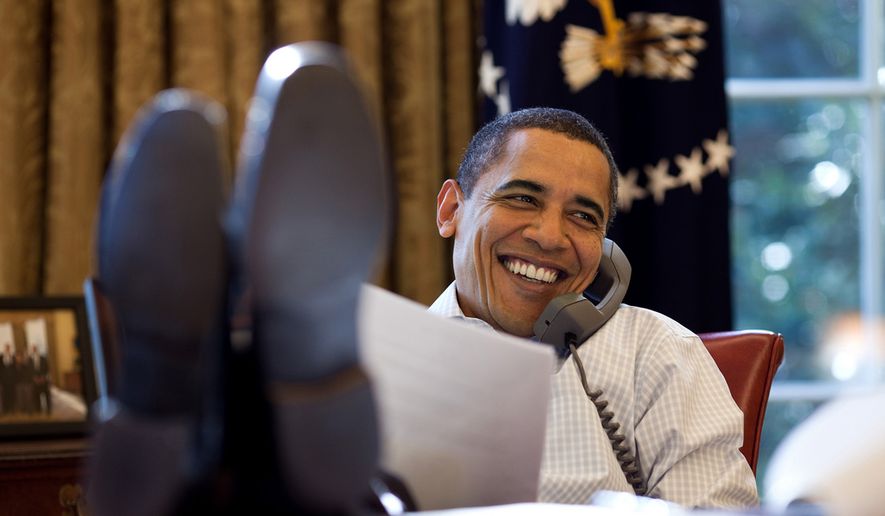The Obama administration issued a record number of new regulations on its way out the door in 2016, leaving an administrative state that saps the economy of nearly $2 trillion a year, according to a new report being released Wednesday.
The government itself spent $63 billion in 2016 to administer and enforce all of its own regulations, the Competitive Enterprise Institute said.
With Republicans in Washington looking for reasons to streamline Washington and roll back President Barack Obama’s accomplishments, the new report is likely to be ammunition.
“The federal government’s reach extends far beyond its taxes, deficits, and borrowing. Federal environmental, safety and health, and economic regulations affect the economy by hundreds of billions — even trillions — of dollars annually,” Clyde Wayne Crews Jr. wrote in the CEI’s 2017 “Ten Thousand Commandments” report on federal regulations.
He counted 3,853 federal rules that were finalized in 2016 — the most for any year since 2005.
All told, during his time in office, Mr. Obama issued 685 “major” rules — generally defined as having an economic impact of at least $100 million — compared to 505 during President George W. Bush’s tenure, the CEI report said.
The page count for the Federal Register, which publishes regulations, topped 95,000 new pages in 2016, setting a record, the report said.
The Department of the Treasury led the way among executive branch agencies by accounting for 469 rules among agency priorities, followed by the Interior, Transportation and Commerce departments and the Environmental Protection Agency (EPA). Financial regulations and federal land use issues in the western part of the U.S. were two big battles during the Obama administration.
President Trump already has made regulatory reform a key part of his agenda. He ordered the dismantling of Mr. Obama’s Clean Power Plan, which was a push to regulate carbon emissions in the nation’s power plants, and teamed up with Congress to repeal about a dozen last-minute Obama-era regulations.
But the CEI report said Congress should also bear more responsibility for the “hidden tax” of regulatory costs, which it said gets passed on to consumers to the tune of $15,000 per household.
For example, rather than vote to create new job training programs — and accept the consequences of adding to the federal deficit — lawmakers can instead pass a law requiring major companies to provide job training under rules they delegate to the Labor Department, Mr. Crews wrote.
“The latter option would add little to federal spending but would still let Congress take credit for the program,” he wrote. “By regulating instead of spending, government can expand almost indefinitely without explicitly taxing anybody one extra penny.”
The growth of the so-called “administrative state” has become a major issue in conservative legal circles, with some scholars saying it’s time to push the federal courts to roll back regulatory power and force it back into the hands of Congress.
Newly installed Supreme Court Justice Neil M. Gorsuch drew praise from some conservative circles with his opinion in a case last year in which he said it may be time for the high court to show less deference to regulatory agencies’ decisions.
On Capitol Hill, Republicans are pushing another solution: fewer regulations all around.
In January the House passed the REINS Act, which would require Congress to vote on major rules before they can take effect. That legislation hasn’t gone anywhere in the Senate.
Congress has, however, used the Congressional Review Act (CRA) to overturn a dozen last-minute Obama-era regulations. Previously the tool had been used just once to overturn a Clinton-era rule.
Democrats have tried to throw up roadblocks to Republicans’ deregulation efforts, saying many rules are intended to protect consumers, notably in the area of financial oversight.
Senate Minority Leader Charles E. Schumer said earlier this month that the recent uses of the CRA were more about helping special interests than rolling back burdensome regulations.
“They are giveaways to big oil, big gas, big coal, big mining and wealthy special interests,” he said.
The total federal regulatory cost was $1.963 trillion in 2016, which marked an increase of about $100 billion since 2012, according to Mr. Crews’ analysis.
Mr. Trump can also order reviews within his own administration, hoping to knock out rules that tie the economy’s hands.
But White House budget director Mick Mulvaney said it’s not always easy to unwind long-embedded regulations.
“As we’ve been through the process, what we’ve learned is, it’s not that hard to slow down an agency on creating new regs,” Mr. Mulvaney recently told the Senate Budget Committee. “But when you ask an agency, a bureaucratic agency that is designed to create regs, to start to deregulate themselves … it’s a muscle that they have not used for a long time, if ever.”
Still, Mr. Obama’s penchant for using regulations as an end run around Congress means some of them are easier to undo now, said Tim Phillips, president of Americans for Prosperity.
“Right now we’re seeing enormous progress rolling back the extreme environmental regulations of the Obama years precisely because our side was successful in stopping the extreme environmental legislation during the eight years of Obama,” said Mr. Phillips, whose group lobbies for lower taxes and fewer regulations.
• David Sherfinski can be reached at dsherfinski@washingtontimes.com.




Please read our comment policy before commenting.